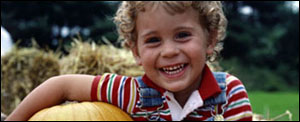CDC Features
Current Features
MMR Vaccine: The Best Protection Against Mumps

One of the best ways to protect children from vaccine-preventable diseases is to vaccinate them on time. Check your child's medical records to see whether he or she has already received the MMR vaccine (for measles, mumps, and rubella).
Mumps is traditionally thought of as a childhood disease. The mumps virus affects the saliva glands, causing the puffy cheeks and swollen jaw that used to be almost a routine part of childhood. This scene became less common after the mid-1960s, when a vaccine was developed against mumps, and today, due to widespread use of MMR (measles, mumps and rubella) vaccines, most parents are unfamiliar with the disease.

But mumps has not disappeared entirely in the United States. In 2006, an outbreak of mumps focused in the Midwest affected more than 6,000 people. Public health experts believe that the high vaccine coverage with two doses of MMR vaccine considerably limited the size of the outbreak, which may otherwise have numbered in the tens or even hundreds of thousands.
Mumps virus causes fever, general discomfort, and usually the characteristic swollen jaw. However, complications can occur and might be more severe in teenagers and adults. Mumps can cause headache and stiff neck (called meningitis), inflammation of the testicles (called orchitis), deafness, and in rare cases inflammation of the brain (called encephalitis), which can lead to permanent disabilities or even death.
The Best Protection Against Mumps – the MMR Vaccine
The mumps vaccine was licensed in 1967 and is usually administered as MMR, a combination vaccine that provides protection from three viral diseases: measles, mumps, and rubella. The MMR vaccine is strongly endorsed by medical and public health experts as safe and effective. Two doses are recommended for children—the first dose at 12 to 15 months of age, and the second dose before entering school at 4 to 6 years old.
See If Your Child's MMR Vaccine Is Due
• Check your child's immunization record,
• Contact their healthcare provider, or
• Visit the immunization scheduler for newborn to 6-year-old children.

Paying for the MMR Vaccine
Health insurance usually covers all or most of the cost of the MMR vaccine. Children 18 years and younger may be eligible to get free vaccines through the Vaccines for Children (VFC) program. To find out more about the VFC program, contact your state VFC Coordinator. To learn more about the VFC program, visit the VFC Web site or ask your child's healthcare provider.
Some Adults Need MMR Vaccine Too!
Anyone born during or after 1957 who has not had mumps or has not been vaccinated is at risk of getting mumps and should receive at least one dose of MMR vaccine. Some adults need two doses of the MMR vaccine because they are at higher risk of getting the disease. Adults at higher risk include college students and other post high school students, international travelers, and healthcare personnel.
More information and resources on mumps vaccination and other vaccinations for persons 0-18
- To learn more about mumps, MMR vaccine, or other childhood vaccines, visit Mumps Vaccination or What Parents Need to Know
- To learn more about measles cases and the 2006 outbreak, visit Update: Multistate Outbreak of Mumps—United States, January 1-May 2, 2006 and Brief Report: Update: Mumps Activity—United States, January 1-October 7, 2006.
- Measles, Mumps and Rubella Vaccines: What You Need to Know (Vaccine Information Statement) (English (
 2 pages, 43 KB) or other languages*)
2 pages, 43 KB) or other languages*) - Infants and Toddlers vaccine topics
- Pre-teens and Adolescents vaccine topics
- For information in Spanish, visit Immunización
- Additional articles in the Childhood Immunization Series: Hepatitis B, Measles
Page last updated: April 10, 2008
Content source: National Center for Immunization and Respiratory Diseases
Content owner: National Center for Health Marketing
URL for this page: www.cdc.gov/Features/Mumps/
*Links to non-federal organizations are provided solely as a service to our users. These links do not constitute an endorsement of these organizations or their programs by CDC or the federal government, and none should be inferred. CDC is not responsible for the content of the individual organization Web pages found at these links.

